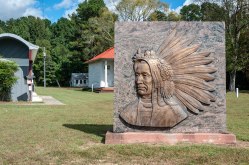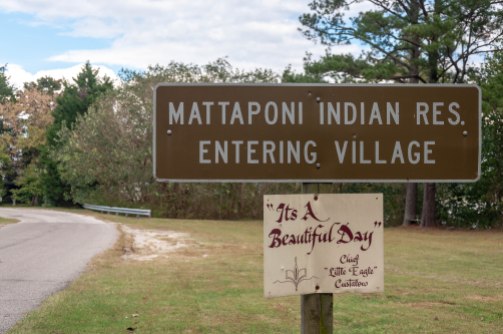Tsenacommacah, that’s what 17th Century English Virginia was called before the English named the land for Queen Elizabeth I. It loosely means “densely inhabited land.” By 17th Century standards the land was pretty well inhabited, and it was inhabited by the many tribes comprising the Powhatan Confederation. That Confederation greatly influenced 17th Century English settlements throughout the century and beyond as some of the Tribes in that alliance still dwell in Virginia today. That being the case, I wanted to bring to light Native Virginian’s fascinating lives and society. And I believe no one could better illustrate their lives and society than Ashley Spivey, herself a Pamunkey Tribe member.
Dr. Ashley Spivey joins me in this episode to discuss Indigenous Virginian history, the changes they felt, and the concerns facing modern Virginian tribes today. She brings to this discussion a spectacular wealth of information that has been forged through her upbringing, impressive academic credentials, and solid history and foundation work throughout Virginia’s landscape. Tune in, you’ll be glad you did!
LINKS TO THE PODCAST:
- Virginia’s Native History – Interview with Dr. Ashley Spivey
- RSS Feed
- VA History Podcast on iTunes
- VA History Podcast on Podbay
- VA History Podcast on Spotify
- VA History Podcast on Stitcher
- VA History Podcast Store
SOURCES:
- Custalow, Linwood “Littlebear”. The True Story of Pocahontas. Golden, CO: Fulcrum Publishing, 2007.
- Gallivan, Martin D. James River Chiefdoms: The Rise of Social Inequality in the Chesapeake (Our Sustainable Future). University of Nebraska Press, 2003.
- Gallivan, Martin D. The Powhatan Landscape: An Archaeological History of the Algonquian Chesapeake (Society and Ecology in Island and Coastal Archaeology). Gainsville, FL: University of Florida Press, 2016.
- Gleach, Frederic. Powhatan’s World and Colonial Virginia: A Conflict of Cultures (Studies in the Anthropology of North American Indians). Lincoln, NE: University of Nebraska Press, 2000.
- Lutz, Lara; Gallivan, Martin D.; Turner III, E. Randolph; Brown, David A.; Harpole, Thane; and Moretti-Langholz, Danielle. Virginia Indians at Werowocomoco. Richmond, VA: Virginia Department of Historic Resources, 2015.
- Rountree, Helen C. The Powhatan Indians of Virginia: Their Traditional Culture (The Civilization of the American Indian Series). Norman, OK: University of Oklahoma Press, 1989.
- Rountree, Helen C. and Turner III, E Randolph. Before and After Jamestown: Virginia’s Powhatans and Their Predecessors (Native Peoples, Cultures, and Places of the Southeastern United States). Gainesville, FL: University of Florida Press, 2002.
- Rountree, Helen C. Pocahontas’s People: The Powhatan Indians of Virginia Through Four Centuries (The Civilization of the American Indian Series). Norman, OK: University of Oklahoma Press, 1990.
- Rountree, Helen C. Pocahontas, Powhatan, Opechancanough: Three Indian Lives Changed by Jamestown. Charlottesville, VA: University of Virginia Press, 2006.
- Spivey, Ashley. “Knowing the River, Working the Land, and Digging for Clay: Pamunkey Indian Subsistence Practices and the MarketEconomy 1800-1900” College of William & Mary, Dissertations, Theses, and Masters Projects.Paper 1516639670, 2017.
- Waugaman, Sandra F. and Moretti-Langholz, Danielle. We’re Still Here: Contemporary Virginia Indians Tell Their Stories. Palari Pub, 2000.
BONUS LINKS:
- Frederic W. Gleach
- Danielle Moretti-Lanholz
- Pamunkey Indian Tribe
- Mattaponi Indian Tribe
- Monocan Indian Tribe
- Nottoway Indian Tribe
- Chickahominy Indian Tribe
- Rappahannock Indian Tribe
- Nansemond Indian Nation
- Long-Awaited Tribal Recognition… And What It Means for William & Mary – Joseph McClain for WY Daily.
- Pamunkey Recognition – Ben Swenson for Colonial Williamsburg.
- Commemoration 2019
All photography used on this site is owned and copyrighted by the author unless otherwise noted. The featured image is Dr. Ashley Spivey taken on the Pamunkey Reservation.
Music used for this episode – Louis Armstrong and the Mills Brothers,”Carry Me Back to Old Virginia” available on iTunes, and “Uranus, The Magician” from the Planets Orchestral Suite Op. 32 by Gustav Holst performed by the London Symphony Orchestra, conducted by Sir Colin Davis, also available on iTunes.















My brother just got back from a trip out West and he visited a Mormon Genealogy site and discovered that we are 10th generation grandchildren of Pocahontas. Is there any way you can help confirm this
LikeLike
Hi Mark, thanks for your comment. It’s interesting that you’re sending this when you are. I’m actually about to begin a series on what are collectively called the First Families of Virginia, and the first family on the list is the Bolling Family.
The Bollings might not factor in to your search, but they’re the ones who married into the Rolfe family. Thomas Rolfe, John and Pocahontas’ son, came back to VA and married a Jane Poythress, had a daughter, also named Jane, who then married Robert Bolling. That Bolling line is connected to so many of Virginia and America’s leading families including names like Randolph, Jefferson, et. al.
It’s been said that the Randolph family is in some way related to most native Virginians. That being the case, you might very well trace your search through them back to the Bollings and then Pocahontas.
A few resources could prove to be very helpful in your search
1. Adventurers of Purse and Person: Virginia 1607-1624/5. John Frederick Dorman
2. Pocahontas, alias Matoaka, and her descendants. Wyndham Robertson
3. The Bolling Memoirs. Robert Bolling.
4. https://www.bolling.net/ They have an interesting website with various links that could be very helpful to your search.
LikeLike